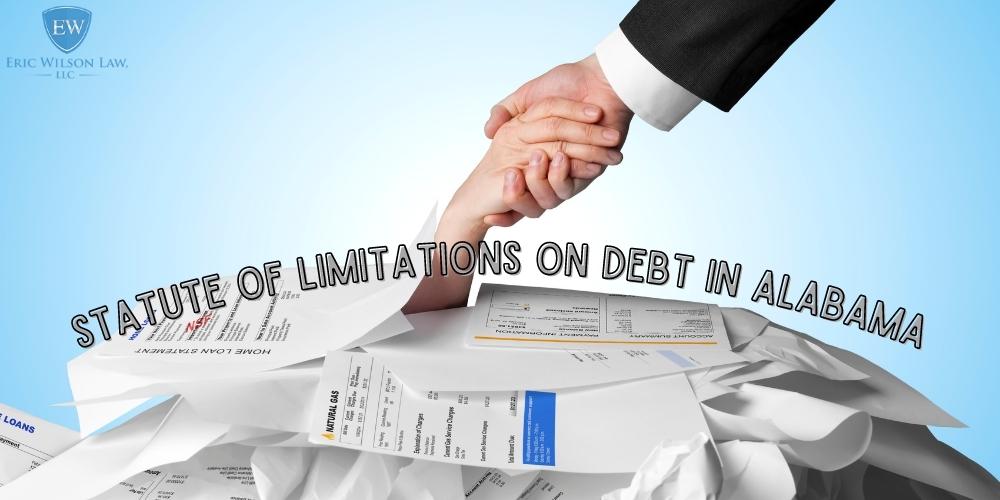You may have heard of statute of limitations in reference to civil lawsuits like personal injury lawsuits. But not many people realize that there is a statute of limitations on debt as well, and it varies depending on the state and the type of debt owed. The statute of limitations on debt is basically a set time period that a debt collector has to pursue debt collection through wage garnishment, garnishment of a bank account, a property levy, or even a lawsuit. If a debt collector sues you (or engages in other debt collection practices) after the statute of limitations expires, they can face legal trouble. Below, Eric Wilson discusses the statute of limitations on debt in Alabama.
If you’re facing creditor harassment, foreclosure, repossession, wage garnishment, property levies, or judgments for old debts, it’s crucial to seek financial help from a professional. Eric Wilson has more than 25 years of experience in helping his clients achieve a debt free life through Chapter 7 and Chapter 13 bankruptcy. He will listen to your story, ensure that you’re enduring fair debt collections practices, and determine the best debt relief method for your financial situation. Call 205-349-1280 to schedule a free consultation at his law firm today.
What is the Statute of Limitations on Debt?
Let’s start with the basics. Statute of limitations is a federal law that sets a time limit for how much time plaintiffs have to file a lawsuit for a specific grievance. Most people hear this term in reference to civil lawsuits – like personal injury lawsuits. Each state law sets a specific statute of limitations for how long a plaintiff can sue a responsible party for their injuries.
The statute of limitations on debt is a similar concept. This means that a judgment creditor or debt collector only has a specific amount of time to file a lawsuit against someone in order to recover unpaid debt. If a creditor or debt collector doesn’t file a court judgment within the statute of limitations, then they can no longer recover money from you through any means.
What is the Statute of Limitations on Debt in Alabama?
So what is the debt statute of limitations in Alabama? The answer depends on the type of old debt owed. Alabama law mentions two main categories of debt: debt based on accounts and contracts.
Alabama state law (AL Code § 6-2-37) says that debt collectors have 3 years to file a debt collection lawsuit on an open account, such as a credit card account. The clock starts ticking 3 years from the date of the last action on the account in question.
As for contract debt, Alabama statutes (AL Code § 6-2-36) say that debt collectors have 4 years from the date of a breached contract to file a lawsuit against a debtor.

Alabama Statute of Limitations on Specific Debt Types
There are many types of debts that fall within those aforementioned categories. If you’re struggling with debt and judgments for the first time in your life, you may be confused about which time barred debt is considered contract-based or account-based. From there, you may have no idea what the specific statute of limitations is. Below, we explain the specifics of all time barred debts according to Alabama laws.
Open and Unliquidated Accounts
Our state’s laws give debt collectors three years to sue a debtor for unpaid debt on an open or unliquidated account. A common example of outstanding debt on unliquidated and open accounts is credit card debt. This means that a credit card company – or collection agencies – can file a judgment against you within 3 years of the last payment on your credit card account.
Stated or Liquidated Account
Creditors and/or debt collectors have 6 years to file a judgment against you for outstanding debt on a personal loan or other stated account.
State Tax
If you owe state tax debt, the state has 3 years to audit your tax return, recover other tax or interest, as well as pursue penalties. This must be done 3 years from the date the tax return is filed or due – whichever date comes later. After the 3 year time period has passed, the state can no longer hold you accountable for any tax debt.
Breach of Contract of Sale
The statute of limitations for breach of contract of sale is between 1 and 4 years. In other words, the time limit can’t be reduced to less than 1 year, and increased to more than 4 years. It all depends on what both parties in the contract agree on. Outstanding debts from auto loans fall under this category.
Written Contracts
There are two types of written contracts: sealed and unsealed. Common examples of written contracts include lease agreements, insurance agreements, medical debts, etc.
Debt collectors have 6 years to file a judgment for an unsealed written contract. The clock starts ticking from the day you first defaulted on a payment. Meanwhile, the statute of limitations for sealed written contracts is much longer – it’s 10 years from the date you defaulted on payments.
Oral Contract
Oral contracts – AKA oral agreements – have a 6 year statute of limitations in Alabama.
Rent
In Alabama, a debt collector has 6 years from the date of your last rent payment to file a judgment against you. Rent can be a verbal agreement or a written contract, but most commonly, it’s a written contract.
Judgment
The statute of limitations for judgments in Alabama is 10 to 20 years. What this means is that a judgment is enforceable for 10 years, and if such judgment is still not paid after that time, it can be renewed for another 10 years.
Using The Statute of Limitations as a Defense
There are some affirmative defenses you can use in your favor if you’re facing debt collection or judgments in Alabama.
Firstly, it’s important to realize that the statute of limitations on debt in Alabama heavily depends on whether or not you’re in the state. In other words, the clock will start ticking once you’re in Alabama. If you leave the state for several months or years, that time will be subtracted during time limit calculations for a debt collection lawsuit.
As previously explained, if the outstanding debt passes the statute of limitations, a debt collector can no longer pursue debt collection methods like wage garnishment, property levies, or judgments. This doesn’t mean that the debt has disappeared into thin air. You still owe the debt collector money.
The only exception to this rule is if you make a partial payment on an outstanding debt. If you do this, the statute of limitations will start over again, and the debt collector can resume debt collection methods.
If your rights listed under the Fair Debt Collection Practices Act (FDCPA) are being violated, it’s crucial to seek legal counsel from an experienced lawyer like Eric Wilson. He can listen to your situation, help you come up with the best defense against abusive creditors, and help you find a way out of your debt through a payment plan or bankruptcy.
How To Stop Debt Collection Actions in Alabama
The best way to stop all debt collection practices against you – such as wage garnishment, bank garnishment, property levies, and judgments – is to pay off your debt. But of course, this is way easier said than done.
In order to figure out the best debt relief option, you should contact Eric Wilson right away. He can help you determine if filing for Chapter 7 or Chapter 13 bankruptcy is the best solution to your debt problems. Filing bankruptcy immediately puts an end to creditor harassment, wage garnishment, bank garnishment, foreclosure, repossession, and more. Additionally, filing for bankruptcy could relieve you from the majority of your debts in as little as 90 days.
Additionally, Eric Wilson could help you negotiate with your creditors. Believe it or not, it’s hard to get people to pay their debts in a timely manner. Your creditor just might agree on a different payment plan or even a lower payment if it means they don’t have to waste so much time suing you.
Above all else, Eric Wilson will defend your legal rights throughout the entire debt repayment process.

Call a Tuscaloosa Bankruptcy Lawyer at Eric Wilson Law Today
If you’re currently facing creditor harassment, wage garnishment, garnishment of a bank account, foreclosure, repossession, a property levy, or even a judgment, it’s crucial to reach out to a professional like Eric Wilson. He can help you determine if filing for bankruptcy is the right solution for your financial situation. Most importantly, he will protect your legal rights and help you achieve the debt free life you deserve. Call 205-349-1280 to schedule a free consultation today.


